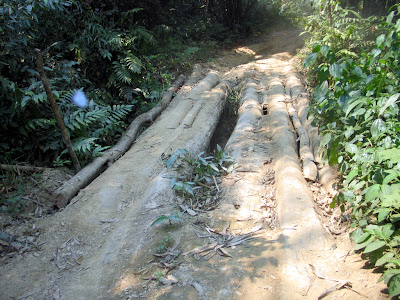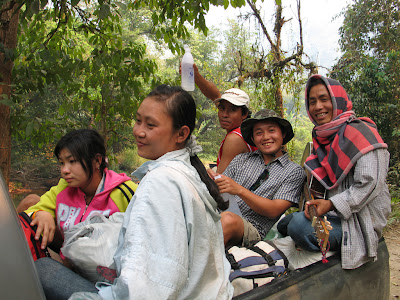
It is a rugged 5 hour drive one-way, up and down a couple of steep jungled mountains, and requires crossing the river about twenty times. This trip was in the height of the dry season and we drove through brushfires along both sides of the road giving it the feeling of being in a war zone, complete with gunfire which is simulated by the burning bamboo. In fact, if you listen carefully during the audio recordings, you can here the popcorn popper-like sound of the fires burning in the distance. The popping sound is caused by the trapped water in the burning bamboo stalks, which burst as the water inside them boils.

On trips made closer to the wet season, afternoon thunderstorms will make it a challenge to travel up or down the steep muddy road which can quickly turn into a stream. Together with the darkness encountered in the dense forest, the heavy rain combined with the bone jarring bumps, the tires spinning in the mud, and the thunder and lightning make for a surreal World and a thrilling experience to say the least. Low spots in the road which fill with water quickly are spanned with makeshift log "faith" bridges which disappear under two or three feet of muddy water, and "faithfully" keep your vehicle above another three feet of muddy water. I should point out that during the wet season, to visit this village requires a two day trek.

On this trip we left the village of Huaymalai in our Nissan crew-cab shortbed Diesel engined four-wheel drive pickup, with seven people, several large bags of rice, a couple of dozen blankets, and all of our gear which pretty much filled the bed. The Thai government forestry service maintains two stations on the way to the border, and visitors must sign in and out, coming and going. Residents of the village we were on our way to, frequently make their way to these stations and wait for the next vehicle going their way. At the first station we gained three more passengers, another between the stations, and three more at the second station.

The bottom-line of all of this is that before one can share the messages contained in the Bible in a remote Karen village, one must get there. And in doing so, one will certainly begin to realize that they are no longer in a traveler's World of electricity, supermarkets, motels, gas stations, and roadside convenience stores. We see from our guest riders their gratitude for providing them transportation home. And their genuine thanks is all they have to offer, and all that is required.
Their payment for the ride is called "Kawthoolei money", named from the Karen word for Karen State in Burma, and is given with the simple phrase "Dah-blooht!", which is the Karen word for "thank you".

As long as it was physically possible, and someone was willing to fit into whatever space was available, nobody was refused a ride. Frequent stops were made to allow everyone to make nature calls, reposition themselves and their bundles, and to position ropes across the truckbed for the riders to hang onto as they are repeatedly jounced into the air. It does not take long to realize that for these people, this is traveling in comfort. Usually when travelling in Thailand, important lessons can be learned all along the way. Each trip coming or going was the same, and everyone is treated as a family member all of the way to their destination.

Along the way we saw a couple of locations where the Karen had built waterwheeel rice pounders for removing the husks from the rice. In small villages you will find many homemade rice pounders which are usually human powered, and each as unique in design as the the bamboo and thatch huts each family constructs based on their family "technique". After my first visit to a Karen community, I came away with the opinion that the Karen could have built Disneyland with bamboo and a machete.
After washing off a couple of pounds of red Thai dust in the cold rushing water of the nearby creek, we enjoyed some 3-in-1 coffee, and relaxed for a bit before enjoying a Karen dinner of rice, pork, and vegetables by the light of candles. While this remote village has no electricity, piped water, or telephones, compared to the small jungle settlements of Karen internally displaced refugees in their bamboo and thatch huts, this village at least has a road (sometimes), a couple of small shops where tools and farm implements can be purchased, and perhaps most importantly, a clinic.

The following videos portray about fifteen minutes out of a ten hour round trip 4WD ride out to the border village we visited. Out of four visits I made to the village, the conditions ranged from hot, humid, and dusty, to cold, rainy, and muddy, but each trip was memorable for all who came along. The "road", is extremely rough and rocky at times, and often is no wider than our vehicle. Many times, especially after it rains, giant Burmese bamboo, and even whole trees will have fallen across the road. Machetes and hand-saws will be used to chop through them and clear the path. It is a very good idea to come prepared with plenty of tools, food, and water. Each video is accompanied by Burmese music soundtracks for a little local flavor.
********** Thailand Traveler Homepage *********